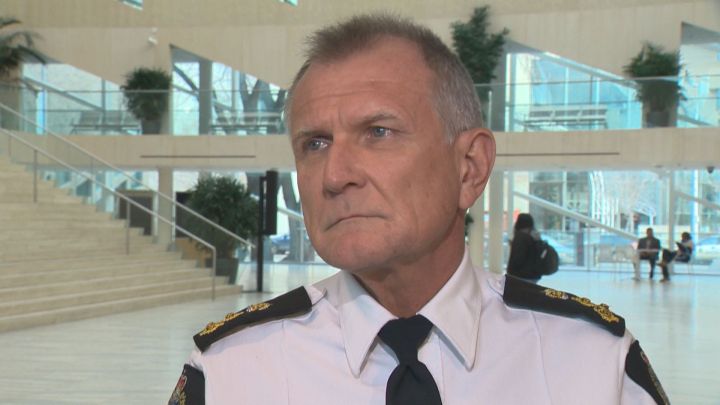Edmonton Police Chief Rod Knecht is once again defending the service’s policy to not release the name of every homicide victim in the city.

“Police must follow the law,” Knecht wrote in a letter published in the Edmonton Journal.
“It is perplexing to be criticized repeatedly when we stand by the principles of legislation and the dignity of those who are suffering the greatest of loss.”
In the letter published Thursday, Knecht specifically fired back at Postmedia columnist Paula Simons, who has been critical of the policy.
“Contrary to Ms. Simons’ unwavering opinion, the mere fact that an individual has been the victim of a homicide is not legally sufficient rationale to disclose that individual’s name.”
READ MORE: Edmonton police chief defends policy of not releasing names of homicide victims
Early in 2017, Edmonton police stopped naming victims unless there was an investigative reason to do so.
Edmonton police say they evaluate each homicide on a “case-by-case basis” and when they decide to withhold a victim’s name, it is because “it does not serve an investigative purpose and the EPS has a duty to protect the privacy rights of the victims.”
In August of last year, the Alberta Association of Chiefs of Police (AACP) united on guidelines surrounding the naming of homicide victims. The framework states that disclosing a victim’s name is considered to be “an unreasonable invasion” of a person’s privacy. The decision by police to release the name needs to be backed up with sufficient evidence to rebut the protections which the law affords a victim.
“The rule of law means that the law applies equally to everyone and that no one is above the law,” Knecht’s letter reads. “Our politicians, the wealthy, celebrities, judges . . . everyone must obey the law. There is an even stronger public expectation that police will follow these same laws.”
READ MORE: Alberta police chiefs unite on guidelines for releasing names of homicide victims
Knecht said it is impossible to explain all the considerations that go into deciding whether a homicide victim’s name should be released. However, he referenced three sections of the Freedom of Information and Protection of Privacy Act (FOIP), stating in part “a matter must be ‘clearly in the public interest’ as opposed to a matter that may simply be ‘of interest to the public.’
“Arbitrary publication of the personal information of every homicide victim would go against privacy legislation, potentially put critical investigations and prosecutions at risk, and contravene the wishes of many family members who are suffering through unimaginable loss.”
The names of homicide victims are part of the information police file with the courts when charges are laid, meaning the names do eventually become public if charges are laid. If charges are never laid, though, the victim’s name is not publicly released.
Fred Kozak, a local media lawyer, said deciding what is and isn’t in the public interest is subjective.
“There’s an interpretation of the act and they’re defaulting to one side of the equation,” Kozak said of the EPS’ approach. “It’s clear that the release of any factual information about a crime, especially a homicide, often serves to reassure the public that our police agencies are taking appropriate steps in their investigation of the crime.
“The public often wants to be reassured and that need to be reassured should be a strong and compelling reason to release the name of the victim and any other information that doesn’t undermine an ongoing police investigation.”
Kozak said he understands there are circumstances where releasing a homicide victim’s name may have an adverse effect on an ongoing police investigation, but when that’s not the case, a victim’s name is “information that should be in the public domain.”
“I think that we should take all appropriate steps to prevent anonymous deaths, regardless of how they occur.”
READ MORE: Refusing to release homicide victims names ‘unreasonable,’ says RTDNA Canada
Police have been following these rules “for the past number of years,” Knecht said, adding what’s changed is “the realization that we are now further required by law to only release as much personal information as necessary to solve crimes.”
“We are accountable to the families of the victims, who don’t want today’s grief to become tomorrow’s headlines or social media musings, to the courts, who want facts and information that are untainted by reckless media speculation and to the communities we serve,” the police chief said.
“To avoid criticism, the easy thing would be to unlawfully and unethically publish the name of every homicide victim. I would rather take the criticism and do what is right.”
Police said Edmonton recorded 42 homicides in 2017. Of those, police withheld the names of 17 victims.
Of the three homicides in Edmonton so far this year, police released the names of two of the victims.
What do you think? Weigh in on our poll below.



Comments